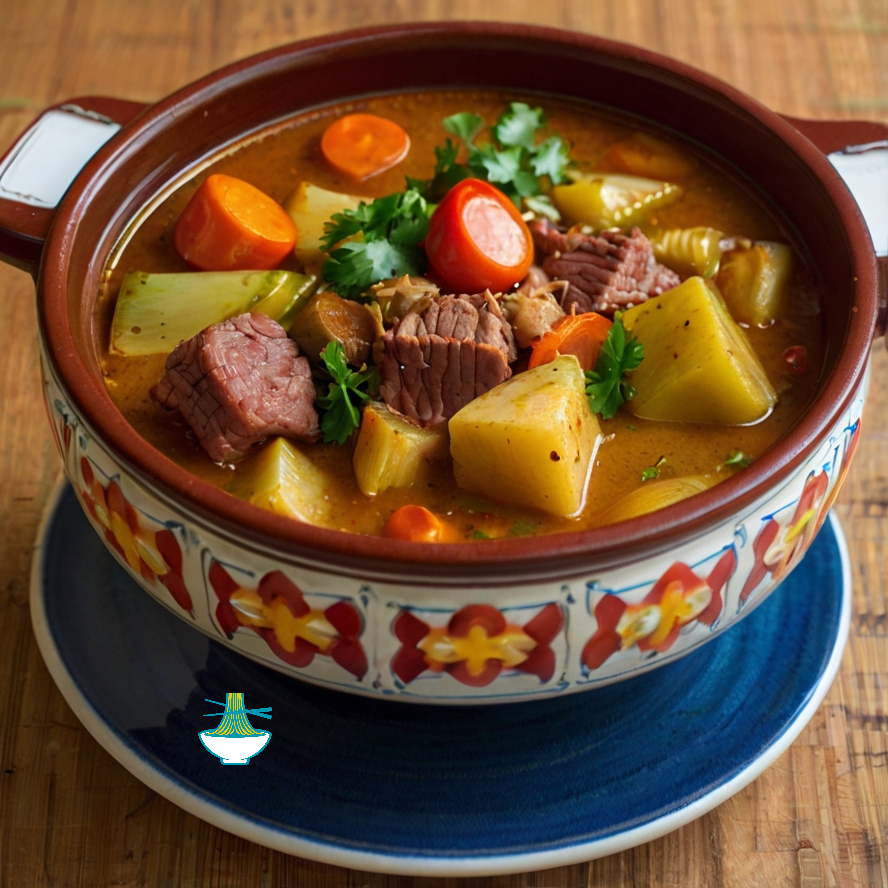Discover the perfect Puchero recipe, a comforting stew crafted with tender beef, vibrant vegetables, and optionally, rice or pasta. Dive into this traditional dish, brimming with savory flavors and wholesome ingredients, perfect for cozy family dinners or gatherings with friends. Try our easy-to-follow recipe today and savor the warmth and richness of this classic culinary delight.
Ingredients:
- 1 lb beef stew meat, cubed
- 2 tablespoons olive oil
- 1 onion, chopped
- 2 cloves garlic, minced
- 2 carrots, peeled and sliced
- 2 potatoes, peeled and diced
- 1 cup green beans, trimmed and cut into bite-sized pieces
- 1 can (14 oz) diced tomatoes
- 4 cups beef broth
- Salt and pepper to taste
- Optional: 1 cup rice or pasta (such as vermicelli or small pasta shapes)
- Chopped fresh parsley for garnish
Instructions:
1-Heat olive oil in a large pot or Dutch oven over medium heat. Add the beef stew meat and brown on all sides, about 5-7 minutes. Remove the beef from the pot and set aside.
2-In the same pot, add the chopped onion and garlic. Sauté until softened and fragrant, about 3-4 minutes.
3-Return the browned beef to the pot. Add the carrots, potatoes, green beans, diced tomatoes (with their juices), and beef broth. Season with salt and pepper to taste.
4-Bring the mixture to a boil, then reduce the heat to low. Cover and simmer for about 1 hour, or until the beef and vegetables are tender.
5-If using rice or pasta, add it to the pot during the last 15-20 minutes of cooking, stirring occasionally, until the grains are cooked through.
6-Once everything is cooked and tender, taste and adjust the seasoning if needed. Serve hot, garnished with chopped fresh parsley.
Enjoy your hearty and delicious Puchero stew!
Nutritional Values:
Beef Stew Meat (1 lb):
- Calories: 960
- Protein: 90g
- Fat: 64g
- Carbohydrates: 0g
benefits:
- High in protein, essential for muscle repair and growth.
- Good source of iron, which is important for oxygen transport in the body.
- Provides essential vitamins and minerals like B vitamins, zinc, and selenium.
Olive Oil (2 tablespoons):
- Calories: 240
- Protein: 0g
- Fat: 28g
- Carbohydrates: 0g
benefits:
- Rich in heart-healthy monounsaturated fats.
- Contains antioxidants that help reduce inflammation and protect cells from damage.
- May contribute to improved cholesterol levels and heart health.
Onion (1 medium):
- Calories: 44
- Protein: 1g
- Fat: 0g
- Carbohydrates: 10g
benefits:
- Contains antioxidants that may help reduce the risk of chronic diseases.
- Rich in vitamin C and other nutrients that support immune function.
- Contains prebiotic fibers that support gut health and digestion.
Garlic (2 cloves):
- Calories: 10
- Protein: 0g
- Fat: 0g
- Carbohydrates: 2g
benefits:
- Has antibacterial and antiviral properties that may help fight infections.
- Contains compounds that may help lower blood pressure and cholesterol levels.
- May have anti-inflammatory effects and support cardiovascular health.
Carrots (2 medium):
- Calories: 50
- Protein: 1g
- Fat: 0g
- Carbohydrates: 12g
benefits:
- Excellent source of beta-carotene, a powerful antioxidant that is converted into vitamin A in the body, important for vision and immune function.
- Rich in fiber, which aids digestion and helps maintain a healthy weight.
- Contains vitamins and minerals like vitamin K, potassium, and vitamin C.
Potatoes (2 medium):
- Calories: 320
- Protein: 8g
- Fat: 0g
- Carbohydrates: 72g
benefits:
- Good source of complex carbohydrates, providing energy for the body.
- Contains vitamin C and potassium, important for immune function and muscle health.
- Provides dietary fiber, which supports digestive health and may help regulate blood sugar levels.
Green Beans (1 cup):
- Calories: 34
- Protein: 2g
- Fat: 0g
- Carbohydrates: 8g
benefits:
- Low in calories and rich in fiber, making them beneficial for weight management ad digestive health.
- Good source of vitamins A, C, and K, as well as folate and minerals like manganese.
- Contains antioxidants that help protect cells from damage and reduce inflammation.
Canned Diced Tomatoes (14 oz can):
- Calories: 90
- Protein: 4g
- Fat: 0g
- Carbohydrates: 20g
benefits:
- Rich in lycopene, an antioxidant that may help reduce the risk of certain cancers and promote heart health.
- Good source of vitamins C and K, as well as potassium and folate.
- Low in calories and fat, making them a healthy addition to meals.
Beef Broth (4 cups):
- Calories: 20
- Protein: 4g
- Fat: 0g
- Carbohydrates: 0g
benefits:
- Provides hydration and helps maintain electrolyte balance in the body.
- Contains amino acids that support muscle repair and growth.
- May help soothe the digestive system and support gut health.
Rice or Pasta (1 cup cooked):
- Calories: 200-250 (varies depending on type)
- Protein: 4-8g
- Fat: 0-1g
- Carbohydrates: 40-50g
benefits:
- Provides carbohydrates, the body's main source of energy.
- Contains some protein and fiber, depending on the type.
- Can be a versatile and filling addition to the meal, adding texture and flavor.
These values are approximate and can vary based on factors such as specific brands, cooking methods, and serving sizes. Always refer to the nutritional information on packaging for the most accurate values.


Comments